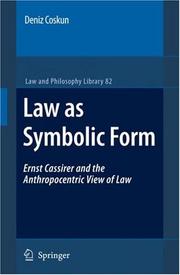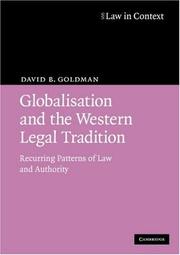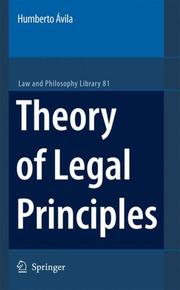| Listing 1 - 10 of 13 | << page >> |
Sort by
|
Book
ISSN: , ISBN: 2247092969 Year: 2007 Publisher: Paris : Dalloz,
Abstract | Keywords | Export | Availability | Bookmark
 Loading...
Loading...Choose an application
- Reference Manager
- EndNote
- RefWorks (Direct export to RefWorks)
Law --- Historiography --- Jurisprudence --- Legal history --- History. --- Philosophy. --- Methodology. --- History and criticism
Book
ISBN: 9781402049514 1402049501 9781402049507 9786613437983 140204951X 1283437988 Year: 2007 Publisher: Dordrecht Springer
Abstract | Keywords | Export | Availability | Bookmark
 Loading...
Loading...Choose an application
- Reference Manager
- EndNote
- RefWorks (Direct export to RefWorks)
A Treatise of Legal Philosophy and General Jurisprudence is the first-ever multivolume treatment of the issues in legal philosophy and general jurisprudence, from both a theoretical and a historical perspective. The work is aimed at jurists as well as legal and practical philosophers. Edited by the renowned theorist Enrico Pattaro and his team, this book is a classical reference work that would be of great interest to legal and practical philosophers as well as to jurists and legal scholar at all levels. The work is divided The theoretical part (published in 2005), consisting of five volumes, covers the main topics of the contemporary debate; the historical part, consisting of six volumes (Volumes 6-8 published in 2007; Volumes 9 and 10, published in 2009; Volume 11 published in 2011 and volume 12 forthcoming in 2012/2013), accounts for the development of legal thought from ancient Greek times through the twentieth century. The entire set will be completed with an index. Volume 6: A History of the Philosophy of Law from the Ancient Greeks to the Scholastics edited by Fred D. Miller, Jr., in association with Carrie-Ann Biondi Volume 6 is the first of the Treatise's historical volumes (following the five theoretical ones) and is dedicated to the philosophers' philosophy of law from ancient Greece to the 16th century. The volume thus begins with the dawning of legal philosophy in Greek and Roman philosophical thought and then covers the birth and development of European medieval legal philosophy, the influence of Judaism and the Islamic philosophers, the revival of Roman and Christian canon law, and the rise of scholastic philosophy in the late Middle Ages, which paved the way for early-modern Western legal philosophy. Volume 7: The Jurists' Philosophy of Law from Rome to the Seventeenth Century edited by Andrea Padovani and Peter Stein Volume 7 is the second of the historical volumes and acts as a complement to the previous Volume 6, discussing from the jurists' perspective what that previous volume discusses from the philosophers' perspective. The subjects of analysis are, first, the Roman jurists' conception of law, second, the metaphysical and logical presuppositions of late medieval legal science, and, lastly, the connection between legal and political thought up to the 17th century. The discussion shows how legal science proceeds at every step of the way, from Rome to early modern times, as an enterprise that cannot be untangled from other forms of thought, thus giving rise to an interest in logic, medieval theology, philosophy, and politics all areas where legal science has had an influence. Volume 8: A History of the Philosophy of Law in The Common Law World, 1600-1900 by Michael Lobban Volume 8, the third of the historical volumes, offers a history of legal philosophy in common-law countries from the 17th to the 19th century. Its main focus (like that of Volume 9) is on the ways in which jurists and legal philosophers thought about law and legal reasoning. The volume begins with a discussion of the common law mind' as it evolved in late medieval and early modern England. It goes on to examine the different jurisprudential traditions which developed in England and the United States, showing that while Coke's vision of the common law continued to exert a strong influence on American jurists, in England a more positivist approach took root, which found its fullest articulation in the work of Bentham and Austin.
Philosophy. --- Philosophy of Law. --- Theories of Law, Philosophy of Law, Legal History. --- Law, general. --- Philosophy (General). --- Philosophy of law. --- Law. --- Droit --- Jurisprudence --- Law --- Philosophy
Book
ISBN: 3540294953 Year: 2007 Publisher: Berlin : Springer,
Abstract | Keywords | Export | Availability | Bookmark
 Loading...
Loading...Choose an application
- Reference Manager
- EndNote
- RefWorks (Direct export to RefWorks)
Kotulla, Deutsches Verfassungsrecht 1806 bis 1918 Das auf mehrere Bände angelegte Werk präsentiert nahezu das gesamte deutsche Verfassungsrecht des Zeitraumes zwischen 1806 und 1918. Hiermit wird der sich gleichsam schrittweise vollziehende Übergang von einem traditionell ständischen oder gar fürstlich-absolutistischen zu einem zumeist monarchisch-konstitutionellen System aufgearbeitet, dessen jäher Untergang schließlich in die nationalstaatlich-republikanisch geprägte demokratisch-parlamentarische Staatsform Weimars mündet. Mit dem Gesamtwerk steht dem Fachpublikum eine leicht zugängliche, bislang nicht gekannte Fülle von Dokumenten zur Verfügung, die für die verfassungsrechtliche Entwicklung Deutschlands und seiner einzelnen Staaten von zentraler Bedeutung waren. Dabei wird großer Wert auf die authentische, d. h. buchstaben- und zeichengetreue Übernahme der Texte gelegt. Dem jeweiligen Dokumententeil sind in jedem Band "Historische Einführungen" vorangestellt. In diesem Rahmen werden an den einschlägigen Dokumenten orientierte (verfassungs-) rechtliche, zeitlich wie territorial übergreifende entwicklungsgeschichtliche Darstellungen vorgenommen. 2. Band: Bayern Band 2 macht nahezu 340 Verfassungsdokumente (einmalig in diesem Umfang) zugänglich, die für Bayerns Entwicklung zu einem monarchisch-konstitutionellen Staat prägend wurden. Begleitet wird die Textedition durch eine ausführliche historische Einführung. .
Law—Philosophy. --- Law. --- Constitutional law. --- History. --- Theories of Law, Philosophy of Law, Legal History. --- Constitutional Law. --- History, general. --- Constitutional history --- Constitutional law
Periodical
ISSN: 16618610 18661149 Year: 2007 Publisher: Frankfurt am Main, Germany : V. Klostermann
Abstract | Keywords | Export | Availability | Bookmark
 Loading...
Loading...Choose an application
- Reference Manager
- EndNote
- RefWorks (Direct export to RefWorks)
Law --- Droit --- Periodicals. --- Périodiques --- Recht --- Grundlagenforschung --- Law. --- Acts, Legislative --- Enactments, Legislative --- Laws (Statutes) --- Legislative acts --- Legislative enactments --- law and society --- legal theory --- jurisprudence --- legal history --- Jurisprudence --- Legislation --- Regions --- General and Others --- Dret internacional.

ISBN: 1280957867 9786610957866 1402062567 1402062559 9048175844 Year: 2007 Publisher: Dordrecht : Springer Verlag,
Abstract | Keywords | Export | Availability | Bookmark
 Loading...
Loading...Choose an application
- Reference Manager
- EndNote
- RefWorks (Direct export to RefWorks)
Jurisprudence, according to Cassirer, is not merely the systematic, conceptual pursuance of ethics. They are separate domains for Cassirer, and both direct their claims differently on the individual. Whereas ethics concerns the motives of the individual, law ultimately achieves a cosmos for our world of outward actions. However, they are not separated by a neutral line or a vacuum. For law to have effect as a symbolic form it is necessary that it reflects the law in the mind of people i.e., that one could and ought to have assented to it out of ethical principles and maxims. The conceptual analysis of law goes hand to hand with its genetic account. Both ethics and law are products of, spring forth from the formative or symbolic powers of man, and although, as any other symbolism, they might confront us as something objective, i.e., as part of reality that is beyond our immediate reach, ultimately we must always bring them to account to their very source: our independent and individual moral judgment. In this book we describe the rule of law as the reign of persuasion rather than the reign of force, and democracy as the reign by persuasion rather than the reign by force.
Law --- Philosophy. --- Cassirer, Ernst, --- Jurisprudence --- Philosophy (General). --- Philosophy of law. --- Political science. --- Fundamentals of Law. --- Theories of Law, Philosophy of Law, Legal History. --- Philosophy, general. --- Philosophy of Law. --- Political Science. --- Administration --- Civil government --- Commonwealth, The --- Government --- Political theory --- Political thought --- Politics --- Science, Political --- Social sciences --- State, The --- Law—Philosophy. --- Law. --- Mental philosophy --- Humanities --- Acts, Legislative --- Enactments, Legislative --- Laws (Statutes) --- Legislative acts --- Legislative enactments --- Legislation
Book
ISBN: 940179880X 9401798788 Year: 2007 Publisher: Dordrecht : Springer Netherlands : Imprint: Springer,
Abstract | Keywords | Export | Availability | Bookmark
 Loading...
Loading...Choose an application
- Reference Manager
- EndNote
- RefWorks (Direct export to RefWorks)
A Treatise of Legal Philosophy and General Jurisprudence is the first-ever multivolume treatment of the issues in legal philosophy and general jurisprudence, from both a theoretical and a historical perspective. The work is aimed at jurists as well as legal and practical philosophers. Edited by the renowned theorist Enrico Pattaro and his team, this book is a classical reference work that would be of great interest to legal and practical philosophers as well as to jurists and legal scholar at all levels. The work is divided The theoretical part (published in 2005), consisting of five volumes, covers the main topics of the contemporary debate; the historical part, consisting of six volumes (Volumes 6-8 published in 2007; Volumes 9 and 10, published in 2009; Volume 11 published in 2011 and volume 12 forthcoming in 2015), accounts for the development of legal thought from ancient Greek times through the twentieth century. The entire set will be completed with an index. Volume 7: The Jurists’ Philosophy of Law from Rome to the Seventeenth Century edited by Andrea Padovani and Peter Stein Volume 7 is the second of the historical volumes and acts as a complement to the previous Volume 6, discussing from the jurists’ perspective what that previous volume discusses from the philosophers’ perspective. The subjects of analysis are, first, the Roman jurists’ conception of law, second, the metaphysical and logical presuppositions of late medieval legal science, and, lastly, the connection between legal and political thought up to the 17th century. The discussion shows how legal science proceeds at every step of the way, from Rome to early modern times, as an enterprise that cannot be untangled from other forms of thought, thus giving rise to an interest in logic, medieval theology, philosophy, and politics—all areas where legal science has had an influence. Volume 8: A History of the Philosophy of Law in The Common Law World, 1600–1900 by Michael Lobban Volume 8, the third of the historical volumes, offers a history of legal philosophy in common-law countries from the 17th to the 19th century. Its main focus (like that of Volume 9) is on the ways in which jurists and legal philosophers thought about law and legal reasoning. The volume begins with a discussion of the ‘common law mind’ as it evolved in late medieval and early modern England. It goes on to examine the different jurisprudential traditions which developed in England and the United States, showing that while Coke’s vision of the common law continued to exert a strong influence on American jurists, in England a more positivist approach took root, which found its fullest articulation in the work of Bentham and Austin. .
Philosophy of law. --- Philosophy --- Law, General & Comparative --- Philosophy & Religion --- Law, Politics & Government --- Law --- Jurisprudence. --- Philosophy. --- Law. --- Political science. --- Theories of Law, Philosophy of Law, Legal History. --- Philosophy of Law. --- Jurisprudence --- Law—Philosophy. --- Administration --- Civil government --- Commonwealth, The --- Government --- Political theory --- Political thought --- Politics --- Science, Political --- Social sciences --- State, The --- Acts, Legislative --- Enactments, Legislative --- Laws (Statutes) --- Legislative acts --- Legislative enactments --- Legislation

ISBN: 1107173310 0511619553 1282001280 9786612001284 051147962X 051147721X 0511480423 0511475772 0511478739 9780511480423 9780511619557 0521688493 9780521688499 9780521868471 0521868475 Year: 2007 Publisher: Cambridge, UK New York Cambridge University Press
Abstract | Keywords | Export | Availability | Bookmark
 Loading...
Loading...Choose an application
- Reference Manager
- EndNote
- RefWorks (Direct export to RefWorks)
What can 'globalisation' teach us about law in the Western tradition? This important new work seeks to explore that question by analysing key ideas and events in the Western legal tradition, including the Papal Revolution, the Protestant Reformations and the Enlightenment. Addressing the role of law, morality and politics, it looks at the creation of orders which offer the possibility for global harmony, in particular the United Nations and the European Union. It also considers the unification of international commercial laws in the attempt to understand Western law in a time of accelerating cultural interconnections. The title will appeal to scholars of legal history and globalisation as well as students of jurisprudence and all those trying to understand globalisation and the Western dynamic of law and authority.
Law --- Globalization. --- Harmonization of law, International --- International harmonization of law --- International unification of law --- International uniform law --- Unification of law, International --- Uniform law, International --- Legal history --- Global cities --- Globalisation --- Internationalization --- International relations --- Anti-globalization movement --- History. --- Philosophy --- International unification. --- History and criticism --- General and Others

ISBN: 0387464034 9780387464039 1441923616 9786610938179 128093817X 0387464042 Year: 2007 Publisher: New York, NY : Springer Science+Business Media,
Abstract | Keywords | Export | Availability | Bookmark
 Loading...
Loading...Choose an application
- Reference Manager
- EndNote
- RefWorks (Direct export to RefWorks)
What are the limits to criminalisation? Is insult harmful or just offensive? What is wrong with criminalising disrespect to state symbols? Should criminal codes be moral codes? Criminalising Harmful Conduct addresses the issue of legitimate criminalisation in a modern liberal society. It argues that criminalisation, as one of the most intrusive state interventions into the autonomous sphere of the individual, should be limited by normative principles, defining the substance of what can be legitimately proscribed. In part, it is a comparative study between two major criminal legal systems (its theories), the Anglo-American, on one side, and the Continental criminal legal system of Germanic legal circle, on the other. Moreover, the book explores a model structure of the ideal criminalisation in respect of the principles and other criteria that should be followed to render the outcome justifiable. The model‘s central element is the Anglo-American principle called the ‘harm principle’, which is elaborated upon, its main elements (particularly ‘harm’) and functions analysed, and some controversial open questions tackled. Further limits on the harm principle are proposed. An in-depth analysis of four Continental legal concepts, which would on the face of it seem as counterparts to the harm principle, reveals that the overlap is not complete. The concept of ‘legal good’ shows the most potential and is thus examined in more detail. As it might be desirable to adopt the harm principle in the Continent, some practical ideas on how to achieve that are also mentioned.
Criminal law --- Philosophy. --- Criminology. --- Criminal Law. --- Criminology and Criminal Justice, general. --- Criminal Law and Criminal Procedure Law. --- Theories of Law, Philosophy of Law, Legal History. --- Crime --- Crimes and misdemeanors --- Criminals --- Law, Criminal --- Penal codes --- Penal law --- Pleas of the crown --- Public law --- Criminal justice, Administration of --- Criminal procedure --- Social sciences --- Law and legislation --- Legal status, laws, etc. --- Study and teaching --- Criminal law. --- Law—Philosophy. --- Law. --- Acts, Legislative --- Enactments, Legislative --- Laws (Statutes) --- Legislative acts --- Legislative enactments --- Jurisprudence --- Legislation

ISBN: 1281338990 9786611338992 1402058799 1402058780 9048174651 Year: 2007 Volume: v. 81 Publisher: Dordrecht : Springer,
Abstract | Keywords | Export | Availability | Bookmark
 Loading...
Loading...Choose an application
- Reference Manager
- EndNote
- RefWorks (Direct export to RefWorks)
This book intends to help understand and apply principles and rules better. Its target is to keep the distinction between principles and rules whereas structuring it on different foundations than those jurisprudence ordinarily employs. The first object of investigation is the phenomenon of interpretation in Law in order to understand that the classification of certain normative species as either principles or rules depends in the first place on axiological connections that are not ready prior to the interpretation process that unveils them. Then, a definition of principles is proposed, aiming to understand what their unique characteristics are when compared to other norms of the legal order. Thirdly, the conditions for the application of principles and rules are examined, which are the normative applicative postulates. It will be shown, on one hand, that principles not only explicit values, but also set forth precise species of behaviors, though indirectly; on the other hand, the creation of conducts by rules is also to be weighed, even though the behavior set forth in advance may be overcome, depending on the accomplishment of a few requirements. That will surpass both the mere praise of values, which does not create behaviors, and the automatic application of rules. A model is proposed to explain the normative species, which includes structured weighing on the application process while encompassing substantive criteria of justice in its argument, through the analytical reconstruction of the concrete use of normative postulates, especially those of reasonableness and proportionality. All of that is done with a focus on the ability of intersubjective control of the argumentation, which often degenerates into capricious decisionism. "Although there are books about legal rules, and although the role of legal principles has been a focus of legal theory since Dworkin, there has yet to be a serious systematic study of what legal principles are, where they come from, how they are identified, and how precisely they intersect with other sources in legal argument and legal decision-making. Professor Avila's much-needed book fills this gap with rigor, depth, and creativity, and it should become essential reading for anyone interested in legal reasoning and legal argumentation." Frederick Schauer, John F Kennedy School of Government, Harvard University, USA.
Law --- Rule of law. --- Jurisprudence. --- Interpretation and construction. --- Supremacy of law --- Administrative law --- Constitutional law --- Analogy (Law) --- Construction and interpretation (Law) --- Construction and interpretation of statutes --- Interpretation and construction (Law) --- Statutes --- Statutory construction --- Judicial discretion --- Judicial process --- Legal certainty --- Philosophy --- Construction --- Interpretation and construction --- Constitutional law. --- Fundamentals of Law. --- Constitutional Law. --- Theories of Law, Philosophy of Law, Legal History. --- Constitutional limitations --- Constitutionalism --- Constitutions --- Limitations, Constitutional --- Public law --- Law—Philosophy. --- Law. --- Acts, Legislative --- Enactments, Legislative --- Laws (Statutes) --- Legislative acts --- Legislative enactments --- Jurisprudence --- Legislation

ISBN: 9780521688499 9780511619557 Year: 2007 Publisher: Cambridge University press
Abstract | Keywords | Export | Availability | Bookmark
 Loading...
Loading...Choose an application
- Reference Manager
- EndNote
- RefWorks (Direct export to RefWorks)
International economic relations --- Political philosophy. Social philosophy --- Legal theory and methods. Philosophy of law --- Europe --- Globalization. --- Law --- History. --- International unification. --- Philosophy --- Globalization --- Acts, Legislative --- Enactments, Legislative --- Laws (Statutes) --- Legislative acts --- Legislative enactments --- Jurisprudence --- Legislation --- Harmonization of law, International --- International harmonization of law --- International unification of law --- International uniform law --- Unification of law, International --- Uniform law, International --- Legal history --- Global cities --- Globalisation --- Internationalization --- International relations --- Anti-globalization movement --- History --- International unification --- Philosophy&delete& --- History and criticism
| Listing 1 - 10 of 13 | << page >> |
Sort by
|

 Search
Search Feedback
Feedback About UniCat
About UniCat  Help
Help News
News